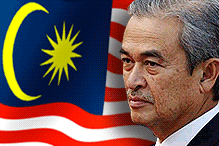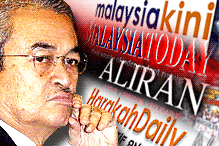"Malaysian lives have the characteristics of an onion. Every time a government minister peels off a layer (by opening his mouth) on public policy, it makes us weep with confusion and virtuous anger," lamented a blogger recently.
But did we not draw wisdom from the printed words of the famous French author, satirist and humanist Voltaire (1694-1778) who wrote, "It is dangerous to be right when the government is wrong." After all, it is not absurd to reflect that under present times, it is better to be an animal than to be a human being.
Think again. To borrow Voltaire's thinking and adapting it to the current hard times, "Animals certainly have more advantages over Man". They don't need press freedom, they do not spread malicious lies or defame others and more importantly, they are not subjected to dehumanising policies.
It is a common jest in political print that in an autocracy, "one person has his say". In an aristocracy, "some people have their say" but in a democracy "nobody has his say".
Or in Bernard Shaw's own sobering words, "All censorship exist to prevent anyone from challenging current conceptions and existing institutions. All progress is initiated by challenging current conceptions and executed by supplanting existing institutions. Consequently the first condition of progress is the removal of censorship. There is the whole case against censorship in a nutshell."
'Togetherness, not control'
 At the 5th Patriotic Festival at Dataran Wawasan in Putrajaya on Aug 29, 2004, Prime Minister Abdullah Ahmad Badawi read part of a poem, entitled, "My Nation of Distinction".
At the 5th Patriotic Festival at Dataran Wawasan in Putrajaya on Aug 29, 2004, Prime Minister Abdullah Ahmad Badawi read part of a poem, entitled, "My Nation of Distinction".
We chose moderation, not extremism,
Inclusion, not isolation,
Trust, not suspicion,
Togetherness, not control.
Rhetorical as it maybe, perhaps it is a consolation to some Malaysians knowing that internet censorship is nothing new in Asia, or anywhere else, even in the most democratic form of governments in the United States and Australia.
Reasoning the matter, our prime minister was recently quoted to have said, "Where in the world is there such freedom, where one can freely spread incorrect information and slander without having to own up to it?"
There is a partial answer to that. According to an article printed in the Infor Nation , it says that Estonia (part of the old Soviet Union) embodies a Constitution with guarantees of press freedom including internet coverage. However, in many other countries, various forms of internet control are rapidly becoming an overt issue as witnessed in China recently.
Perhaps, we should also ask our prime minister, "Where in the world is there a democratic government made for the people, by the people, which is not required to be answerable to the people?"
When the American Congress threatened Internet censorship on certain websites relating to pedophiles and other nefarious miscreants, comments made by those in government and the mainstream media about made many American citizens to wonder if the issue was really about protecting the innocence of children or rather suppressing technologies having the potential to undermine the stranglehold on opinions these institutions once enjoyed.
Suppressing information
At our home ground, it is only ironical that the government who was voted in with overwhelming majority on the platform of creating an open government willing to listen to the voices of truth, remains rhetorical and not a reality in Malaysian life. The disciplinary actions taken against the media industry involving China Press and Sarawak Tribune stand as sore-thumbs in the battle for press freedom in the country.
A great novelist of American fiction Nathaniel Hawthorne (1804-64) whose novels and tales on penetrating explorations of moral and spiritual conflicts once said: "Words, so innocent and powerless as they are, as standing in a dictionary, how potent for good and evil they become, in the hands of one who knows how to combine them!"
 This leads us to ask whether the written word is greater than the power of speeches? The answer is perhaps best answered by most governments in the world. Yet politicians in power are also equally guilty in the suppression of information and hiding the truth from the public.
This leads us to ask whether the written word is greater than the power of speeches? The answer is perhaps best answered by most governments in the world. Yet politicians in power are also equally guilty in the suppression of information and hiding the truth from the public.
If by means of the written word that the secrets of the heart are brought to light, pain of the soul is relieved, hidden grief is carried off, sympathy conveyed, experience recorded, wisdom perpetuated and truth is told, majority of sensible Malaysians would defend press freedom to the last printed word.
Unfortunately in the "real politiking" environment, the marriage of logical reason and wisdom is somewhat muddled between public minds and those of the government officialdom. The complexities of the national issue have given rise to differing opinions across the public domain including suspicions and emotions that our popular internet media being formally controlled to keep in line with the mainstream media is in reality, lies beyond national security, but rather a move by the government to strengthen its own complex political agenda against public dissension.
In the words of the prime minister, "Information in blogs that cause disturbance or compel the public to lose faith in the nation's economic policies, their authors would be detained for investigation."
One may include additionally, "What about articles interpreted by the officialdom as causing Malaysians to lose faith in the government?"
Will such media controls be abused by the government of the day? There is "no feel good" factor in knowing that the government has the monopolistic powers of the propaganda networking machinery.
To proponents of press freedom, it makes sense that freedom to express one's views effectively (within the confines of the laws) requires not only freedom from government suppression, but the opportunity of access to the "free" media (non-government and non-political party controlled). Rightly or wrongly, they believe that these are the best vehicles to encourage public discourses with an open mind based on the principle of freedom of expression, taking into account others' sensitivities and that an unwarranted transgression into interpersonal or community values be avoided.
Free to follow
The only way Malaysians will respect a government is when it is a government truly founded on integrity based on credibility and that credibility comes from "truthfulness". It is not the people's choice but that of the government to become either a servant of the truth or a servant of "issues".
Otherwise it is self-defeating when this political leadership promised Malaysians an "open government" to enable Malaysians to create a knowledge-based society and economy at the previous 2004 general election.
If the government sincerely wants Malaysians to pursue knowledge, then we must be free to follow wherever that search may lead us. To borrow the paraphrase of an American Democratic politician Adlai Stevenson Jr, "Our free mind is not a barking dog to be tethered on a ten-foot chain."
 The Minister of Energy, Water and Communication Dr Lim Keng Yaik said there would be no censorship as promised in the Bill of Guarantee but bloggers are not above the law for what they publish in cyberspace. Actions will also be taken against those spreading rumors or malicious material via the SMS.
The Minister of Energy, Water and Communication Dr Lim Keng Yaik said there would be no censorship as promised in the Bill of Guarantee but bloggers are not above the law for what they publish in cyberspace. Actions will also be taken against those spreading rumors or malicious material via the SMS.
Threat to national security and racial unity are feeble reasons repeatedly used to justify so many of our draconian laws encompassing the control of the media. On the other side, moderate thinking Malaysians also strongly feel that, "Power (of the government) always has to be kept in check; power exercised in secret, especially under the cloak of national security, is doubly dangerous."
American Senator of the Democratic Party Edward William Proxmire (1915-2005) was famous for issuing the Golden Fleece Awards in American politics, identifying wasteful government spending between 1975 and 1988. He successfully stopped numerous science and academic projects of dubious value. Does this not sound familiar to Malaysians, government projects that were self serving and had wasted the taxpayer's ringgit?
Have a heart
Aliran on May 3, 2005 carried a message on World Press Freedom Day, reminding all Malaysians that the late veteran journalist MGG Pillai believed that press freedom could not be attained on a silver platter. His commitments to independent journalism and his love for press freedom should continue to be a motivating force for all concerned Malaysians.
The Lebanese-born poet, philosopher and artist Kahlil Gibran (1883-1931) said, "Yesterday we obeyed kings and bent our necks before emperors. But today we should kneel only to truth, follow by beauty, and obey only love."
Governments should be human. They should have a heart. Didn't Mahatma Gandhi remind us that "good government is no substitute for self-government?" Otherwise the patriot must always be prepared to defend his country from his government. Nobody wants a paternalistic government, a government which keeps telling us what to read, say, eat, drink and wear.
Political instability, riots and violence in any country is not caused by the 'written word'. Critical thinking tells us that world wars are not caused by bloggers but political leaders in power.
Finally, the former first prime minister of Trinidad and Tobago (independence from Great Britain, Aug 31, 1962) during his country's independence day said, "Democracy should rest on a higher power than Parliament. It rests on an informed and cultivated and alert public opinion. The members of parliament are only representatives of the citizens. They cannot represent apathy and indifference. They can play the part allotted to them only if they represent intelligence and public spiritedness."
STANLEY KOH is a Buddhist monk and works for a local think-tank.

